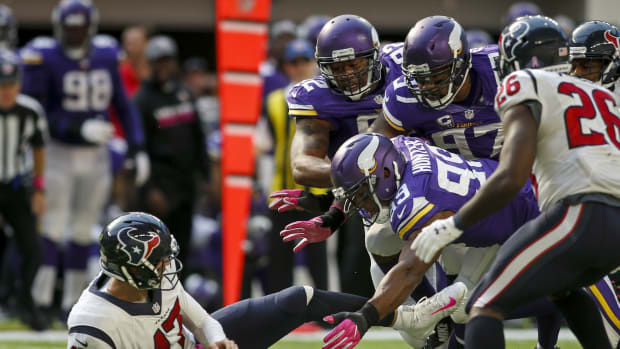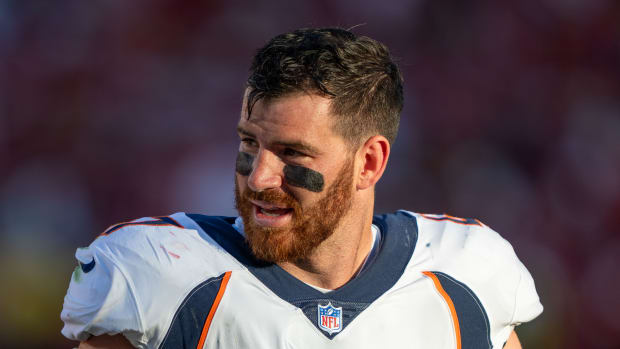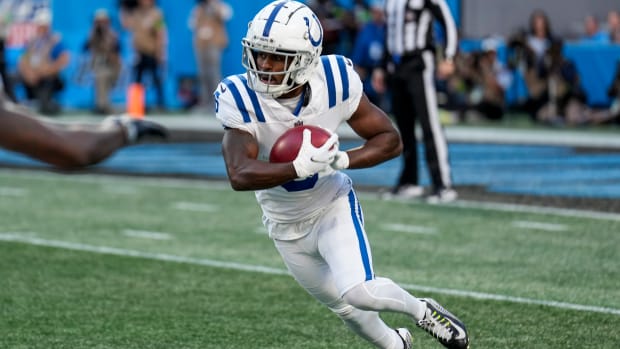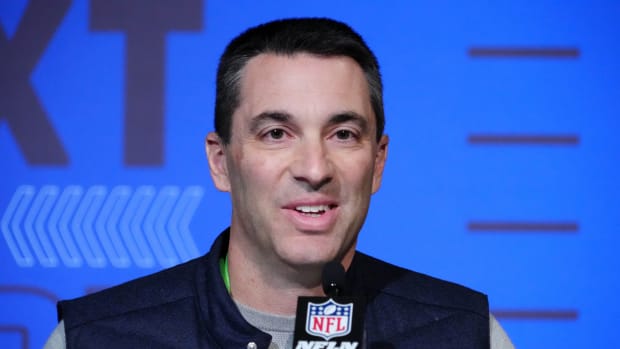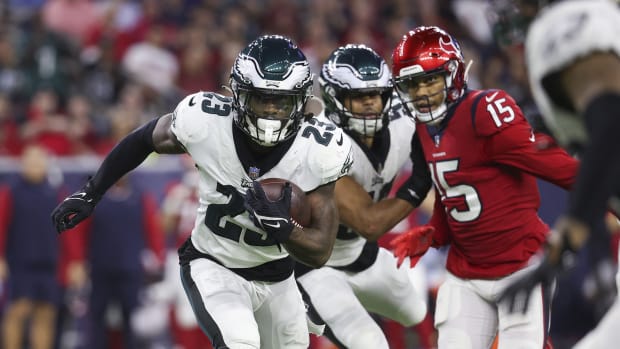Could Mason Rudolph-Myles Garrett Dispute End Up in Court?
Three months ago, Cleveland Browns defensive end Myles Garrett told NFL officials that Pittsburgh Steelers quarterback Mason Rudolph had directed a racial slur at him during the Nov. 14 Steelers-Browns game in Cleveland’s FirstEnergy Stadium. The alleged slur—which Rudolph categorically denies saying and which the NFL says available evidence doesn’t substantiate—would have occurred during an on-field skirmish between Browns and Steelers players. The skirmish was highlighted by Garrett striking Rudolph in the skull with Rudolph’s helmet.
Garrett, who apologized for the strike and who didn’t mention the alleged slur during a post-game press conference, was one of several players suspended by the NFL. Garrett was suspended indefinitely, a term that cost him the final six games of the 2019 season. The suspension could have extended into the 2020 season but NFL commissioner Roger Goodell reinstated Garrett earlier this week.
Latest developments indicate the dispute might be headed for court
The controversy over what Garrett claims Rudolph said had faded until two days ago. During an interview with ESPN’s Mina Kimes, Garrett reiterated his accusation, telling Kimes that Rudolph “called me the N-word . . . he called me a 'stupid N-word.”
On Saturday, the Garrett-Rudolph dispute inched toward potential litigation.
First, Steelers head coach Mike Tomlin rejected the possibility that his quarterback would utter such an offensive remark. Tomlin stressed that he has spoken with numerous Browns players and coaches. None, according to Tomlin, mentioned or even intimated that Rudolph had said “anything racial or anything of that nature.”
Tomlin taking time in the offseason to issue a statement about a controversy from last season highlights the controversy’s unresolved state. Tomlin’s statement also serves as a reminder to Garrett and his representatives that, based on what is presently known, no players on either team corroborate the accusation. Rudolph’s potential case against Garrett would be strengthened if only Garrett claims to have heard the remark.
Second, Rudolph tweeted a statement that hinted at him bringing a defamation lawsuit against Garrett. Rudolph dismissed Garrett’s accusation as “a bold-faced lie” that constitutes “a disgusting and reckless attempt to assassinate my character.” The reference to character assassination is noteworthy. A defamation lawsuit would include an assertion by Rudolph that Garrett has damaged his reputation, perhaps irreparably.
Third, Rudolph’s agency and law firm, Younger and Associates, tweeted a declaration that warns Garrett “is now exposed to legal liability.” The statement ridicules Garrett for claiming that “Mr. Rudolph uttered the slur simultaneously with being taken down” and prior to Garrett committing “a battery by striking Rudolph on the head with a 6 lb helmet.” The agency goes on to assert that Garrett is lying in order to “coax sympathy” and distract from his “inexcusable behavior.”
A possible lawsuit . . .
Whether Rudolph “could” and “will” sue Garrett are two different considerations.
Rudolph certainly could sue Garrett for slander. Slander constitutes a spoken statement that is untrue, factual sounding (as opposed to constituting an opinion), told to others and damages a person’s reputation. Slander is the spoken version of defamation, while libel contemplates defamation in writing. Rudolph would need to prove slander by a preponderance of the evidence, meaning “more likely than not.”
Rudolph could insist that Garrett has falsely accused him of making a specific and derogatory statement and the accusation has harmed Rudolph’s reputation. To that point, Rudolph could introduce expert testimony to show that his potential for signing lucrative endorsement deals has been derailed. Obviously, companies are less likely to pay athletes to endorse their products if those athletes are accused of making racist remarks.
One might question Rudolph’s marketability even without the current controversy. Filling in for an injured Ben Roethlisberger last season, Rudolph threw 13 touchdowns against 9 interceptions before suffering a sternoclavicular joint dislocation in his left shoulder in December. The Steelers hope that Roethlisberger, who is recovering from surgery on his right elbow, will return in 2020. If that happens, Rudolph would probably be back on the bench. As a back-up QB, Rudolph is unlikely to attract top endorsement offers. However, he’s only 24 years old. It could just be a matter of time before Rudolph starts in Pittsburgh or elsewhere. Consequently, if the public believes Garrett, Rudolph’s actual and potential opportunities for endorsements would be hurt.
Rudolph might also be able to establish that a false accusation he called Garrett the “N-word” constitutes slander per se. Such a statement is so outrageous on its face that the plaintiff—here Rudolph—is relieved of the obligation to prove damages. Statements that are likely to cause a person to be hated or shunned can constitute slander per se, though courts are very scrutinizing in recognizing remarks as slander per se.
Rudolph’s lawsuit would be advanced by the apparent absence of evidence in support of Garrett. To date, no coach or player—including those who were within inches of Garrett and Rudolph—has publicly come forward to vouch for Garrett’s accusation. Rudolph would also stress that Garrett notably declined to mention the accusation during his postgame press conference. Garrett also appears to have waited six days to share it and only did so during a hearing that would impact the length of his NFL suspension. In addition, the NFL has not found evidence supporting the accusation. Those factors all favor Rudolph.
. . . but an unlikely lawsuit
There are a number of reasons why Rudolph might decline to pursue a case.
For starters, if Garrett is telling the truth, Rudolph would be ill-advised to sue him. A lawsuit in that circumstance could lead to Rudolph lying under oath. That would present a far more serious risk to Rudolph than protecting his brand: he could be criminally charged with perjury.
Assuming for the moment that Rudolph is telling the truth, he’d still face obstacles in a case.
First, Rudolph almost certainly qualifies as a public figure. This means he’d need to establish “actual malice” in order to advance a slander claim. To that end, Rudolph would need to convince the jury that Garrett knowingly expressed false and defaming information about him or had reckless disregard for the information’s truth or falsity. Therefore, if Garrett genuinely believes that Rudolph made the racist comment, even if Garrett is mistaken—assume Garrett misheard what Rudolph said—Rudolph wouldn’t be able to prove that Garrett knowingly lied. Reckless disregard for the truth would also be hard to show, though Rudolph could question why Garrett didn’t contact him to clarify what he heard.
Second, Rudolph would be subject to pretrial discovery. He would have to answer questions under oath that are related to whether he would say the N-word. Rudolph would be required to share emails, texts and social media posts. If Rudolph has made insensitive remarks about any group of people, he ought to be concerned about the possibility of those remarks damaging his case and going public, too.
Third, Rudolph might struggle to meet the burden of persuasion. If, at the end of a trial, the jury is undecided on whether Rudolph or Garrett is telling the truth, Rudolph would lose. Remember, as the plaintiff, Rudolph would have the burden of convincing the jury. A jump ball, if you will, would result in a loss for Rudolph.
The NFL and NFLPA don’t want litigation
Although it isn’t their call, neither the NFL nor the NFLPA want Rudolph to sue. A lawsuit would likely lead to attempts by Garrett to subpoena recordings and related evidence from the NFL and NFL Films. Subject to various rules and restrictions, NFL Films records the audio of players during games. If Garrett is skeptical of the NFL’s findings, he might suspect the evidence would prove he is telling the truth.
As to the NFLPA, it doesn’t want to see two members of its bargaining unit become the plaintiff and defendant in a lawsuit. Likewise, the NFLPA knows that teammates of Rudolph and Garrett would rather not have to testify, especially if what they say under oath undermines their teammate.
Chances are we won’t see a lawsuit. The dispute will probably end with both men publicly contradicting each other. Rudolph can try to restore his reputation by hinting at a lawsuit but not actually going forward with it. Rudolph wants to signal to the football community—and the companies that might one day want to sign him to endorsement deals—that he is a good person. Garrett, meanwhile, wants to signal that he is telling the truth. Both can accomplish their goals without facing off in court.
Michael McCann is SI’s Legal Analyst. He is also an attorney and the Director of the Sports and Entertainment Law Institute at the University of New Hampshire Franklin Pierce School of Law.
More From All Steelers:
Javon Hargrave Signs With Drew Rosenhaus
Druin Mailbag: XFL Thoughts, Big Ben, Biggest Misconceptions for Steelers and More
































